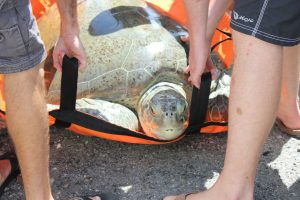US Virgin Islands Hotel & Tourism Association
 Staff at the Nature Conservancy noticed a serious injury that resulted in the inability of a large green sea turtle to deposit her eggs on St. Croix’s east end beaches. The turtle had a deep and large crack across the top of her carapace, likely caused by a boat strike. After several observations of unsuccessful nesting events and abnormal flipper movements, the TNC staff contacted the Sea Turtle Assistance and Rescue and a decision was made by several sea turtle and veterinary professionals to remove the turtle from the beach and give her a thorough evaluation and subsequent care. Staff from TNC, the US Fish and Wildlife Service and several volunteers took on the task of transporting this large turtle off a remote beach and preparing her for veterinary care and transport to St. Thomas.
Staff at the Nature Conservancy noticed a serious injury that resulted in the inability of a large green sea turtle to deposit her eggs on St. Croix’s east end beaches. The turtle had a deep and large crack across the top of her carapace, likely caused by a boat strike. After several observations of unsuccessful nesting events and abnormal flipper movements, the TNC staff contacted the Sea Turtle Assistance and Rescue and a decision was made by several sea turtle and veterinary professionals to remove the turtle from the beach and give her a thorough evaluation and subsequent care. Staff from TNC, the US Fish and Wildlife Service and several volunteers took on the task of transporting this large turtle off a remote beach and preparing her for veterinary care and transport to St. Thomas.
Veterinary staff from Progressive Veterinary Care on St. Croix performed an ultrasound and confirmed that the turtle was carrying eggs. The turtle’s size limited the diagnostic possibilities on St. Croix, according to Palmer, so she was brought to Coral World for additional evaluation on Sept. 4. Coral World is also the only facility in the territory that has appropriate facilities to house large turtles and a veterinary staff that focuses on marine animals. Veterinarian Michelle Halverson from Canines, Cats and Critters took x-rays and performed another ultrasound.
Palmer added, “At Coral World, we provided supportive care and antibiotics, and dealt with the infection of her wound over several weeks. Because the turtle was carrying eggs, we were anxious to get her back to the ocean.”
She was cleared to be released on Sept. 28. Cape Air generously brought a special cargo plane from Puerto Rico to St. Thomas to fly the turtle and Palmer to St. Croix. The turtle was then successfully released on St. Croix’s east end beaches where she was originally found.
All sea turtles are designated as either threatened or endangered under the U.S. Endangered Species Act of 1973. The decline of sea turtle populations is primarily due to human exploitation, loss or degradation of nesting habitat from coastal development and beach armoring; disorientation of hatchlings by beachfront lighting; nest predation by native and non-native predators; degradation of foraging habitat; marine pollution and debris; watercraft strikes; and incidental take from commercial fishing operations. Continued efforts are needed to protect nesting beaches and to minimize the threat from illegal exploitation through intensified law enforcement efforts to curb the incidence of poaching and harassment.
STAR and these other organizations rely on community volunteers, local veterinarians and other donated resources to help marine life. Please call the STAR hotline at 340-690-0474 to report any harmful sea turtle activity.
